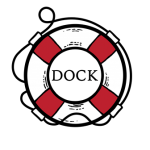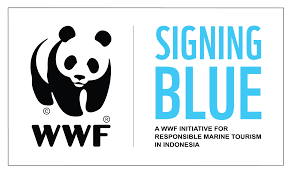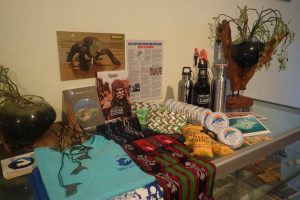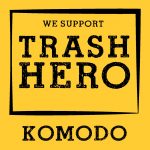- Home
- Sustainability
DiveKomodo Sustainability
Dive Komodo have long been committed to a sustainable future for the Komodo National Park. Over the years we have worked closely with the National Park authority and local NGO’s to try to improve the outlook and protection for the National Park.
A lot has changed over the years that we have been operating, and tourism footfall is increasing fast every year. The threats to the environment from tourism use are becoming bigger and require good management interventions.
Following is a brief summary of the endeavors of Dive Komodo relating to the Socio Cultural, Environmental, and Business sustainability for Flores Komodo.

Prior to DOCK we were active and led or assisted in the following projects along with NGO’s or industry partners:
Design and Installation of a TNC funded mooring project in 2002.
Assisted in the Crowd funded Manta Anchor mooring project of 2007.
The first cleanup day that we organised was in 2008. With the support of Putri Naga Komodo. We took Approximately 200 students for a day out to the local islands to do beach cleaning.
Dive Komodo worked with PNK on the 2009 mooring replacement program.
We had another big cleanup day for earth day 2010 (600 plus participants).
We Also have participated in the DOCK Cleanup days in 2011, 2014, and 2015.
Our team is not only passionate about diving and the incredible marine life we have here, but we also understand the need to sustain a balanced environment for the sake of local community health and economy. You can read about our personal environmental commitments in above section, however we also support many local initiatives working with environmental protection.
Trash Hero is a movement with volunteers who inspire people to reduce their waste and to use greener solutions. Dive Komodo is involved in arranging their activities on a regular basis and you are welcome to join their weekly events; kids education and beach cleanups.
You can also support them by donating kids books and other education materials.
For more details contact them via their Facebook Page Trash Hero Komodo or speak to Sofia at Dive Komodo.
Working with and supporting Manta Watch with the annual internship program to help university students get hands on environmental and conservation experience. Dive Komodo actively supports and assists with this excellent program that helps to educate Indonesias next generation of environmental leaders.
You can support MantaWatch’s research by uploading your manta photo’s and footage to www.mantawatch.com/report

Environmental Commitment Includes:
- Protecting endangered animals and Eco-system through ensuring company environmental Code Of Conduct is followed by staff and guests.
- Only serving seafood that is sustainably caught and avoiding juveniles as well as endangered species.
- Promoting sustainable solutions to the public including providing free public water refill at our office and boats. Selling reusable drinking bottles and shopping bags.
- Keeping our plastic use to minimum by avoiding single-use plastics such as bottles, bags, straws, styrofoam and products with excessive packaging.
- Promoting reuse of materials including using old scuba equipment for up-cycling projects and selling up-cycled goods in our office.
- Recycling as much as possible of our waste
- Staff encouraged to compost or bring organic waste home for animal feed
- Reducing hazardous waste by only using re-chargeable batteries for dive torches/other devices. Having a public battery collection box at office and donating old engine oil to local community for re-use.
- Disposing of non-recyclables and hazardous waste such as old paint, anti-fouling or chemicals responsibly.
- Reducing use of chemicals by switching to more eco-friendly soaps and cleaning products as well as selling coral safe sun cream.
- Reducing fossil fuel consumption by planning boat routes to minimise distance, encouraging staff to use shared transport and sourcing produce/products locally to avoid long delivery distances.
- Reducing electricity use by switching off lights/devices when not in use and using energy saving light bulbs.
- Saving fresh water by using seawater to flush toilets, encouraging shorter showers and promptly fixing any leaks.
- Reducing light and noise pollution during trips.
- Reducing boat speed when close to reef/coast and in areas known to be frequented by animals on the surface.
- Only using anchor when absolutely necessary and only in designated zones declared by park authorities.
- Working with local authorities to support National Park protection such as reporting park violations/injured endangered animals, aiding ranger patrols and installing moorings.
- Working with/supporting local NGO’s with environmental conservation initiatives.
- Arranging public awareness events about marine protection.
- Socio Economic commitment includes;
- Employing local staff whenever possible; 20 of our 22 staff are Indonesian
- Using staff contracts that respects employees customs and follows national employment laws
- Providing health insurance for all staff
- Using local services/produce/products and selling handicrafts to support local economy
- Helping guests to understand and follow cultural etiquette
Further about Signing Blue

- Only visit Komodo National Park with a qualified guide who knows the area.
- Interact responsibly with marine and terrestrial life; do not touch, chase or cause stress. Avoid feeding wild animals as it changes their behaviour.
- Stay 3 meters away from large endangered species including mantas, sharks, dugongs, dolphins and whales.
- Remember that corals are fragile and slow growing so avoid touching them; even a light touch will harm the coral polyps.
- Put your sun cream on at least 30 minutes before jumping into the sea, otherwise the cream will stunt coral growth. Even better, invest in a ‘coral safe” sun cream.
- Do not collect shells, rocks, coral, sand or other natural objects.
- Do not buy souvenirs made form shell or from endangered species such as turtle shell or shark teeth.
- Eat only seafood which is not endangered or under-sized.
Check the WWF Fish Guide and specifically ask for the sustainable species:
- Reduce your waste, especially single use plastics such as bottles, bags, straws, Styrofoam and products with excessive packaging.
- Invest in a reusable bottle and shopping bag. You can refill your bottle for free at many locations in Labuan Bajo. (link to Trash Hero refill stations)
- Recycle at our office.
- Put non-organic waste as cigarette butts in a proper bin.
- Avoid using disposable batteries as they cannot be recycled here. If you have some please bring them back to your country if they can be recycled there.
- Conserve fresh water by keeping showers short; water is a limited resource and is often delivered by truck.
- Dress appropriately when walking around town, visiting villages and during dragon trekking. Both men and women should use clothing that cover shoulders, chest, waist and thighs.
- Ask before taking photos of people.
- Do not give candy or money to kids as it promotes a begging behaviour and tooth brushing is not always practiced.
- Do not drink or be under influence of alcohol when visiting muslim areas.

